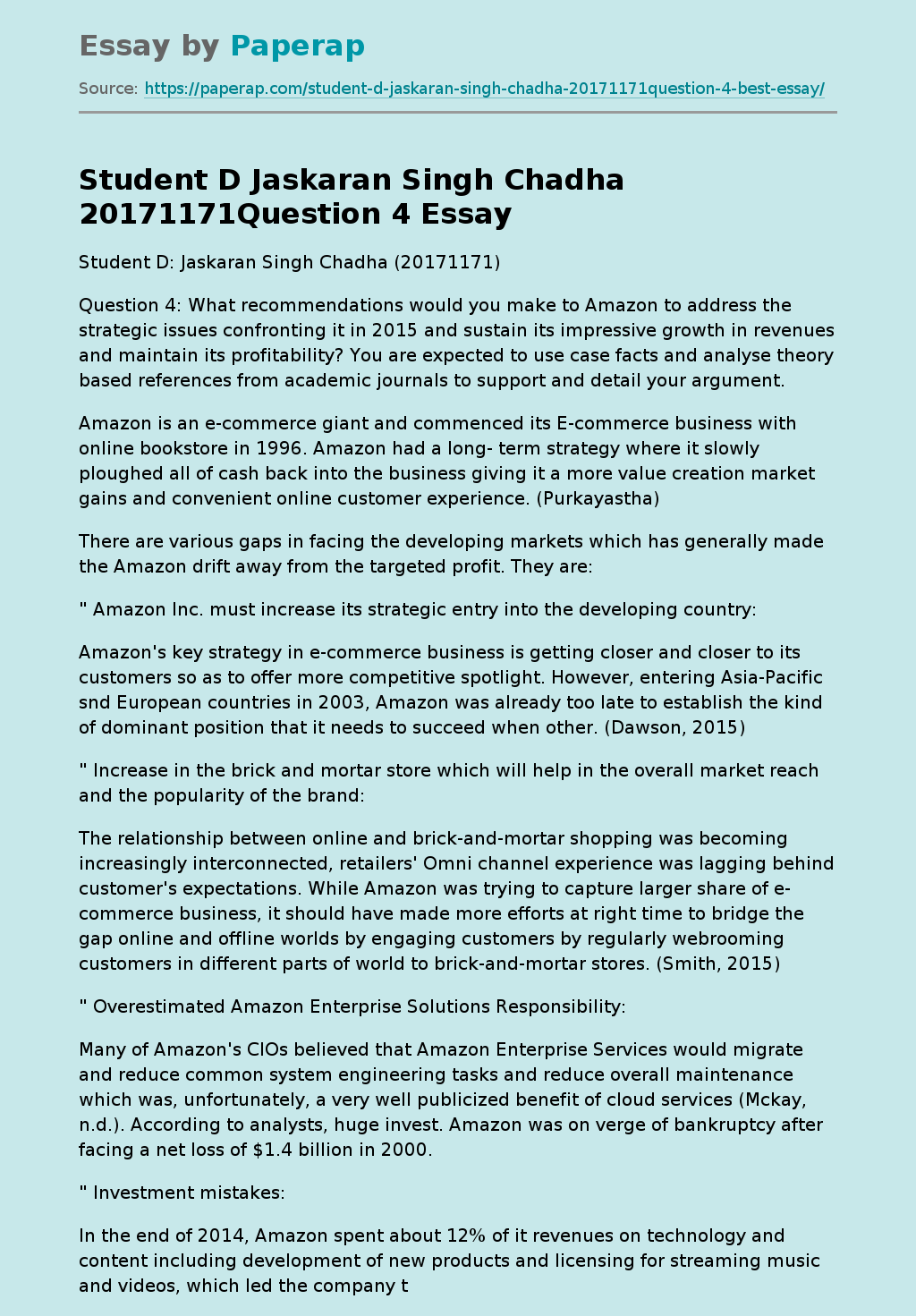Recommendations for Amazon's Strategic Issues
The following example essay on “Amazon Profile” answers the questions, what recommendations would you make to Amazon to address the strategic issues and sustain its impressive growth in revenues and maintain its profitability?
Amazon is an e-commerce giant and commenced its E-commerce business with online bookstore in 1996. Amazon had a long- term strategy where it slowly ploughed all of cash back into the business giving it a more value creation market gains and convenient online customer experience. (Purkayastha)
There are various gaps in facing the developing markets which has generally made the Amazon drift away from the targeted profit.
They are: ” Amazon Inc. must increase its strategic entry into the developing country: Amazon’s key strategy in e-commerce business is getting closer and closer to its customers so as to offer more competitive spotlight. However, entering Asia-Pacific snd European countries in 2003, Amazon was already too late to establish the kind of dominant position that it needs to succeed when other. (Dawson, 2015)
Increase in the brick and mortar store which will help in the overall market reach and the popularity of the brand: The relationship between online and brick-and-mortar shopping was becoming increasingly interconnected, retailers’ Omni channel experience was lagging behind customer’s expectations.
While Amazon was trying to capture larger share of e-commerce business, it should have made more efforts at right time to bridge the gap online and offline worlds by engaging customers by regularly webrooming customers in different parts of world to brick-and-mortar stores. (Smith, 2015)
Overestimated Amazon Enterprise Solutions Responsibility: Many of Amazon’s CIOs believed that Amazon Enterprise Services would migrate and reduce common system engineering tasks and reduce overall maintenance which was, unfortunately, a very well publicized benefit of cloud services (Mckay, n.
d.). According to analysts, huge invest. Amazon was on verge of bankruptcy after facing a net loss of $1.4 billion in 2000.
Investment mistakes: In the end of 2014, Amazon spent about 12% of it revenues on technology and content including development of new products and licensing for streaming music and videos, which led the company to its biggest quarterly loss in its 14 years of business. These investments made by company were not necessary but optional thus substantially, not only proved a very risky move for amazon but also put its shareholder’s and investor’s reliability on stake as well.
Amazon had its finger in every pie and its unsolicited products like Kindle fire tablet, fire smartphone and takeovers of Kiva and Twitch took the company in $170 million debt.
Competition: Finally, the investor’s patience started to run out when huge investments made by amazon did not tend to work out pretty well. Other E-commerce retailers were catching up with the price match guarantees, free shipping and plans to go multi-channel. Amazon was loosing its dominance in keeping the prices low and adjusting its profits than its tech giant rivals Apple Inc., Google Inc., Alibaba.com etc.
Jeff Bezos could have invested in keeping its prices low rather than leveraging its finances in niche markets where the target audience was majority of low-cost segments and stakeholders were expecting profits.
Increase in Amazon prime subscription rates: Amazon prime did not proved to be a very smart idea. Ken lonyai specified that in 2014, amazon spent $6.6 billion on delivery and received only $3.1 billion in shipping fees and later on hedged the losses by increasing the subscription fees from $20 to $35 which in turn affected its low margin model.
Above mentioned are the mistakes Amazon could have avoided to channelize its profits sustaining its impressive growth in revenues and maintain its profitability.
To recapitulate, if you are going to innovate, then you are going to experiment. If you are going to experiment, then more often than not, you are going to fail. So, you need to have the capacity to accept failure as part of the process. (Ari Zoldan (CEO, Quantum Media Group), 2018)
References
- Ari Zoldan (CEO, Quantum Media Group). (2018). Jeff Bezos’s Brilliant Long-Term Strategy (and Why You Should Be Doing the Same Thing). Retrieved from Inc.:
- Dawson, J. (2015, May 11). Amazon’s international growth challenge. Retrieved from Recode:
- Mckay, J. (n.d.). The Biggest AWS Mistakes to Avoid. Retrieved from CIOreview:
- Purkayastha, S. M. (n.d.). Amazon.com’s business modela nd it’s evolution. Hydrabad, India.
- Smith, J. (2015, August 3). 3 Ways Brick-and-Mortar Stores Can Win at Webrooming. Retrieved from Multichannel merchant
Recommendations for Amazon's Strategic Issues. (2019, Nov 29). Retrieved from https://paperap.com/student-d-jaskaran-singh-chadha-20171171question-4-best-essay/

